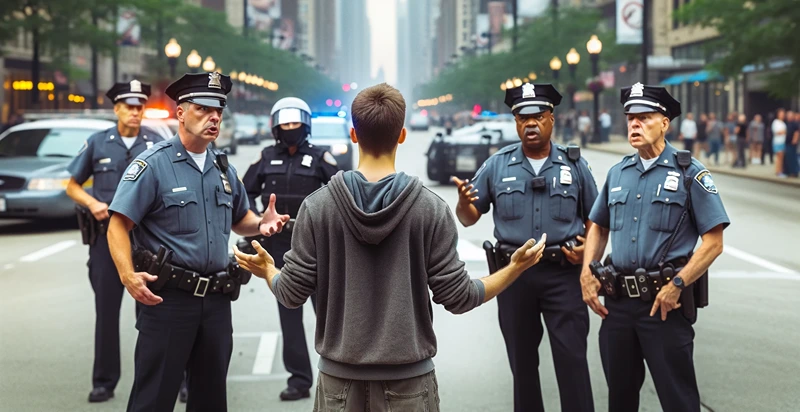
Investigative Article
Arizona Law: Understanding Disorderly Conduct and Its Impact on Your Rights
Disorderly conduct is one of the most common charges levied against individuals in Arizona. While it may seem like a minor crime, understanding what disorderly conduct entails, how it is defined, and what the potential consequences are, is critical to protecting your rights.
What is Disorderly Conduct in Arizona: ARS 13-2904?
Disorderly conduct in Arizona is defined broadly and can encompass a wide range of behaviors. According to Arizona Revised Statutes (ARS) 13-2904, an individual can be charged with disorderly conduct if they:
- Engage in disruptive behavior; or
- Make unreasonable noise; or
- Use abusive or offensive language or gestures to harass or provoke another person.
As demonstrated by this definition, disorderly conduct can include a variety of actions, from verbal altercations to physical harassment. Additionally, the statute specifically notes that if an individual's actions are intended to cause an immediate disturbance or breach of the peace, it can elevate the charge to a class 1 misdemeanor.
What Does Disturbing the Peace Mean?
Disturbing the peace is a common phrase used in relation to disorderly conduct charges, but it can be unclear what actions constitute disturbing the peace. Essentially, disturbing the peace refers to creating an environment that is disruptive, noisy, or otherwise harmful for others around you. As such, many disorderly conduct cases can stem from loud or aggressive behavior in public spaces, including physical altercations or arguments.
Is Cursing Considered Disorderly Conduct?
While it may be common to hear cursing in public spaces, using abusive or offensive language can lead to disorderly conduct charges. Under ARS 13-2904, if an individual uses language or gestures that are intended to provoke or cause a breach of the peace, they can be charged with disorderly conduct.
Drunk and Disorderly Charges
Drunk and disorderly charges are a common subset of disorderly conduct charges. Generally, if an individual is intoxicated and their behavior becomes disruptive or violent, they can be charged with disorderly conduct. However, depending on the severity of the behavior, the penalties can vary widely. For instance, a person who is merely stumbling or slurring their words may face less severe consequences than someone who is violent or belligerent.
Is Domestic Violence Considered Disorderly Conduct?
While domestic violence charges are not specifically classified as a disorderly conduct charge, they can be prosecuted under ARS 13-2904. In some instances, domestic disputes can escalate to the point of a disturbance of the peace, in which case law enforcement may charge the offender with disorderly conduct.
What are the Penalties for Disorderly Conduct?
Depending on the severity of the disorderly conduct, the individual can face a range of penalties. Disorderly conduct charges can range from a class 1 misdemeanor (the most severe level of misdemeanor in Arizona) to a civil violation. Potential consequences include:
- Up to six months in jail
- Up to $2,500 in fines
- Probation or community service
- Permanent criminal record
What are the Defenses For Disorderly Conduct?
While the potential consequences for disorderly conduct can be severe, there are a number of defenses that individuals may be able to use to fight the charges. These can include:
- Self-defense
- Free speech protections
- Challenging the prosecutor's evidence
- Arguing that the conduct was not disruptive or intended to provoke
Frequently Asked Questions
- Can disorderly conduct charges be expunged?
- Expungement laws vary by state, but in Arizona, disorderly conduct charges can potentially be expunged from your record if certain criteria are met.
- What is considered unreasonable noise?
- There is no set decibel level for unreasonable noise, but generally, if the noise is loud enough to cause a disturbance of the peace, it can be considered unreasonable.
- Can minors be charged with disorderly conduct?
- Yes, minors can be charged with disorderly conduct, but the penalties may be different.
How an Arizona Criminal Defense Attorney Can Help
If you are facing disorderly conduct charges in Arizona, it is critical to consult with an experienced criminal defense attorney who can help you navigate the complexities of the law and protect your rights. With the help of a skilled attorney, you may be able to have the charges reduced or dismissed, or explore alternative sentencing options.
At Kolsrud Law Offices, our team of lawyers has extensive experience in criminal defense law and can work with you to build a strong defense. Contact us today to schedule a consultation and learn more about how we can help defend your rights.
Disorderly,ARS-Disorderly Conduct Law in Arizona: ARS 13-2904
Social Plugin